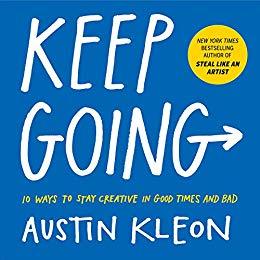More on this book
Community
Kindle Notes & Highlights
by
Austin Kleon
Read between
December 3 - December 9, 2023
The reason is this: The creative life is not linear. It’s not a straight line from point A to point B. It’s more like a loop, or a spiral, in which you keep coming back to a new starting point after every project. No matter how successful you get, no matter what level of achievement you reach, you will never really “arrive.”
The truly prolific artists I know always have that question answered, because they have figured out a daily practice—a repeatable way of working that insulates them from success, failure, and the chaos of the outside world.
A little imprisonment—if it’s of your own making—can set you free. Rather than restricting your freedom, a routine gives you freedom by protecting you from the ups and downs of life and helping you take advantage of your limited time, energy, and talent. A routine establishes good habits that can lead to your best work.
“Almost everything will work again if you unplug it for a few minutes—including you.” —Anne Lamott
“I must decline, for secret reasons.” —E. B. White
You can’t wait around for someone to call you an artist before you make art. You’ll never make it.
Forget the nouns altogether. Do the verbs.
“I don’t know what I am. I know that I am not a category. I am not a thing—a noun. I seem to be a verb, an evolutionary process.” —R. Buckminster Fuller
The great artists are able to retain this sense of playfulness throughout their careers. Art and the artist both suffer most when the artist gets too heavy, too focused on results.
When the writer Lawrence Weschler needs to figure out a structure for one of his pieces, he’ll play with his own set of wooden blocks. “My daughter is not allowed to play with these blocks,” he says. “They are mine.” Don’t get bogged down. Stay light. Play.
“You must practice being stupid, dumb, unthinking, empty. Then you will be able to DO . . . Try to do some BAD work—the worst you can think of and see what happens but mainly relax and let everything go to hell—you are not responsible for the world—you are only responsible for your work—so DO IT.” —Sol LeWitt to Eva Hesse
An Amazon rank doesn’t tell you whether someone read your book twice and loved it so much she passed it on to a friend.
Make gifts for people—and work hard on making those gifts in the hope that those people will notice and like the gifts.” —John Green
You never know when a gift made for a single person will turn into a gift for the whole world.
All this is, of course, wishful thinking. You do not need to have an extraordinary life to make extraordinary work. Everything you need to make extraordinary art can be found in your everyday life.
This is exactly what an artist does: By paying extra attention to their world, they teach us to pay more attention to ours. The first step toward transforming your life into art is to start paying more attention to it.
“For anyone trying to discern what to do with their life: PAY ATTENTION TO WHAT YOU PAY ATTENTION TO. That’s pretty much all the info you need.” —Amy Krouse Rosenthal
“The purpose of being a serious writer is to keep people from despair,” writes Sarah Manguso. “If people read your work and, as a result, choose life, then you are doing your job.”
Find something else to do with your time, something that makes you and the people around you feel more alive.
“The test of a first-rate intelligence is the ability to hold two opposed ideas in the mind at the same time, and still retain the ability to function. One should, for example, be able to see that things are hopeless and yet be determined to make them otherwise.” —F. Scott Fitzgerald
Uncertainty is the very thing that art thrives on. The writer Donald Barthelme said that the artist’s natural state is one of not-knowing.
“I’m making explorations. I don’t know where they’re going to take me.” —Marshall McLuhan
But hope is not about knowing how things will turn out—it is moving forward in the face of uncertainty. It’s a way of dealing with uncertainty.
“Hope is an embrace of the unknown and the unknowable,” writes Rebecca Solnit.
“To think independently of other human beings is impossible,” writes Alan Jacobs in his book How to Think. “Thinking is necessarily, thoroughly, and wonderfully social. Everything you think is a response to what someone else has thought and said.”
It’s always a mistake to equate productivity and creativity. They are not the same.
Salvador Dalí liked to nap while holding a spoon. As he dozed off, he’d drop the spoon and wake up, but still be in the dreamlike state he needed for his surreal paintings.
Walking is a way to find possibility in your life when there doesn’t seem to be any left.
I want to make octogenarian painter David Hockney’s words my personal motto: “I’ll go on until I fall over.”
Try your best to fill them in ways that get you a little closer to where you want to be. Go easy on yourself and take your time. Worry less about getting things done. Worry more about things worth doing. Worry less about being a great artist. Worry more about being a good human being who makes art. Worry less about making a mark. Worry more about leaving things better than you found them. Keep working. Keep playing. Keep drawing. Keep looking. Keep listening. Keep thinking. Keep dreaming. Keep singing. Keep dancing. Keep painting. Keep sculpting. Keep designing. Keep composing. Keep acting.
...more


